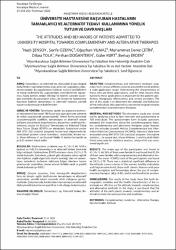ÜNİVERSİTE HASTANESİNE BAŞVURAN HASTALARIN TAMAMLAYICI VE ALTERNATİF TEDAVİ KULLANIMINA YÖNELİK TUTUM VE DAVRANIŞLARI

View/
Access
info:eu-repo/semantics/openAccessDate
2020Author
Şensoy, NazlıÖzdinç, Şerife
Yılmaz, Oğuzhan
Çetin, Muhammet Deniz
Tola, Dilara
Doğantekin, Perihan
Kurt, Güler
Erden, Berkay
Metadata
Show full item recordAbstract
AMAÇ: Tamamlayıcı ve alternatif tıp, dünyadaki birçok değişik kültürlerden kaynaklanmakta olup geniş bir uygulama yelpazesine sahiptir. Bu uygulamaları kullanan kişilerin özelliklerinin ve hangi nedenlerle bu uygulamalara yöneldiklerinin saptanması; hasta tatmini, tedavi etkinliği ve hizmeti sunanlar açısından önemlidir. Bu çalışmanın amacı, bir üniversite hastanesine başvuran kişilerin tamamlayıcı ve alternatif tedaviye yönelik tutum ve davranışlarını belirlemektir. GEREÇ VE YÖNTEM: Tanımlayıcı tipteki bu araştırma üniversite hastanesine başvuran 700 kişiye yüz yüze görüşme yöntemi ile anket uygulanarak gerçekleştirildi. Anket formu içerisinde sosyodemografik özellikler, tamamlayıcı ve alternatif tedavi kullanım durumlarını değerlendiren, araştırmacı tarafından hazırlanmış sorular ile Bütüncül Tamamlayıcı ve Alternatif Tıbba Karşı Tutum Ölçeği (BTATÖ) yer almaktadır. İstatistiksel veriler IBM SPSS V20 istatistik programı kullanılarak değerlendirildi. İstatistiksel yöntem olarak tanımlayıcı istatistikler, ki-kare testi, Mann-Whitney U ve Kruskall–Wallis H testleri kullanıldı ve p<0.05 anlamlı kabul edildi. BULGULAR: Katılımcıların ortalama yaşı 43.10±13.64; %56'sı kadındı ve %92.0’si tamamlayıcı ve alternatif tedavi hakkında bilgi sahibiydi. Katılımcıların BTATÖ ortalama skoru 29.51±5.70 olarak bulundu. Kadınların, yüksek gelir düzeyine sahip sağlıklı olan kişilerin, sağlık algısı kötü kronik hastalığı olan ve tamamlayıcı tedavilerin kullanımı hakkında bilgisi olanların tutum puanlarında istatistiksel olarak anlamlı farklılık vardı ve pozitif olarak bulundu (p<0.05 ). SONUÇ: Çalışma sonuçları, hem demografik değişkenlerin hem de bireyin sağlık özelliklerinin tamamlayıcı ve alternatif yöntemlere yönelik tutum üzerinde etkili olduğunu göstermektedir. Çalışmamızda, katılımcıların tamamlayıcı ve alternatif tıbba yönelik tutumlarının pozitif ve ılımlı olduğu bulunmuştur. OBJECTIVE: Complementary and alternative medicine originates from various different cultures around the world and has a wide application range. Determining the characteristics of those who use these applications, ,and for what reasons they turned to these applications is important for the patient satisfaction, therapeutic effectiveness and service providers. The aim of this study is to determine the attitudes and behaviors of the individuals who applied to a university hospital towards complementary and alternative therapies. MATERIAL AND METHODS: This descriptive study was carried out by applying a face to face interview and questionnaire to 700 individuals. The questionnaire form includes questions prepared the researchers about the sociodemographic features, complementary and alternative therapies usage features and the attitudes towards Holistic Complementary and Alternative Medicine Questionnaire (HCAMQ). Statistical data were evaluated using IBM SPSS V20 statistical program. Descriptive statistics, chi-square test, Mann-Whitney U and Kruskall-Wallis H test were used for statistical analysis, and p<0.05 was considered significant. RESULTS: The mean age of the participants was found at 43.10±13.64; 56% of them were female. It was found that 92.0% of them were familiar with complementary and alternative therapies. The mean HCAMQ score of the participants was found as 29.51±5.70. There was a statistical significant difference in the attitude scores in terms of the women, healthy individuals with high income levels, those with chronic illnesses with poor health perception and knowledge about the use of complementary therapies (all p<0.05), and it was found to be positive. CONCLUSIONS: The results of the study show that both demographic variables and the health characteristics of the individual are effective on the attitude towards complementary and alternative methods. In the study, it was found that the attitudes of the participants towards complementary and alternative medicine were positive and moderate.















